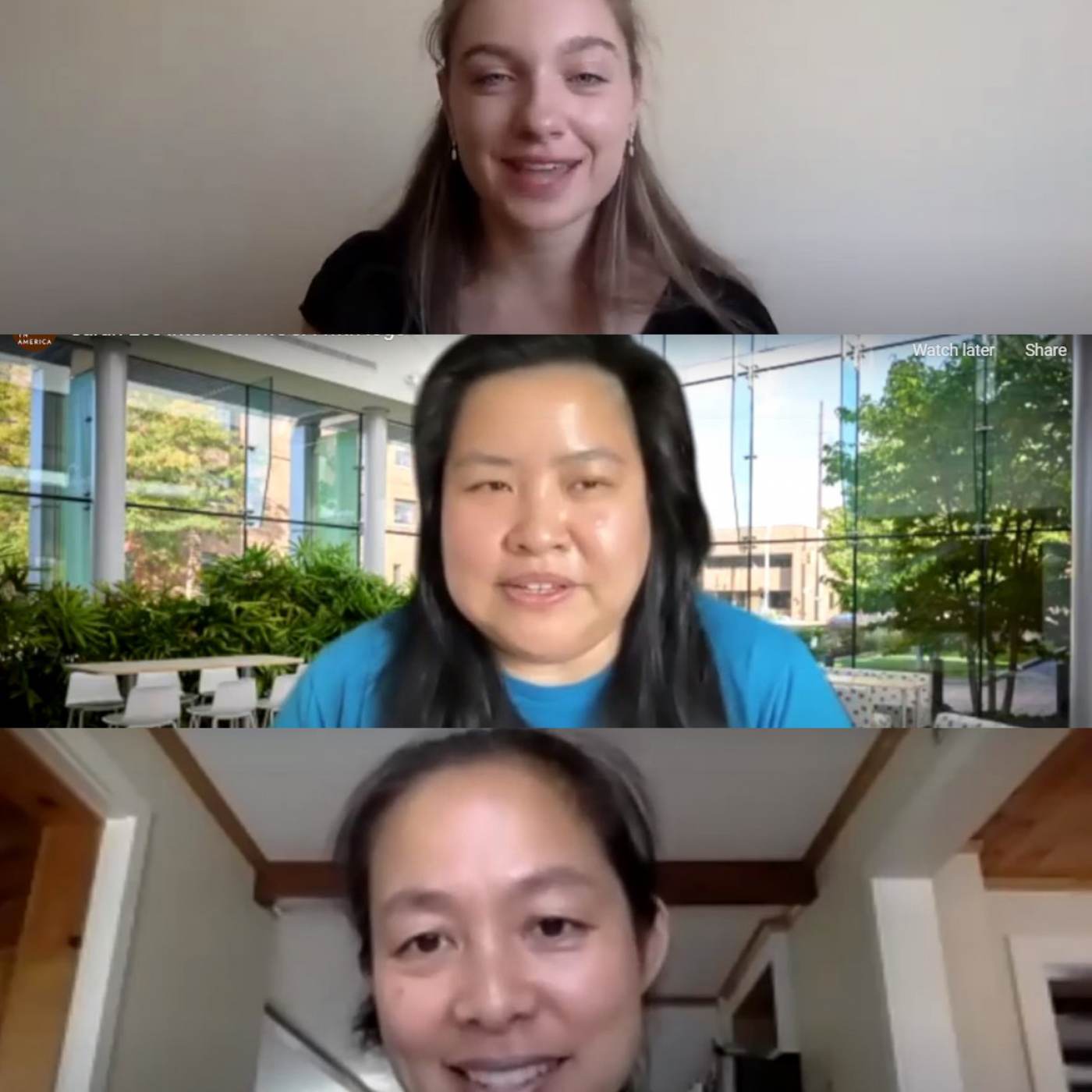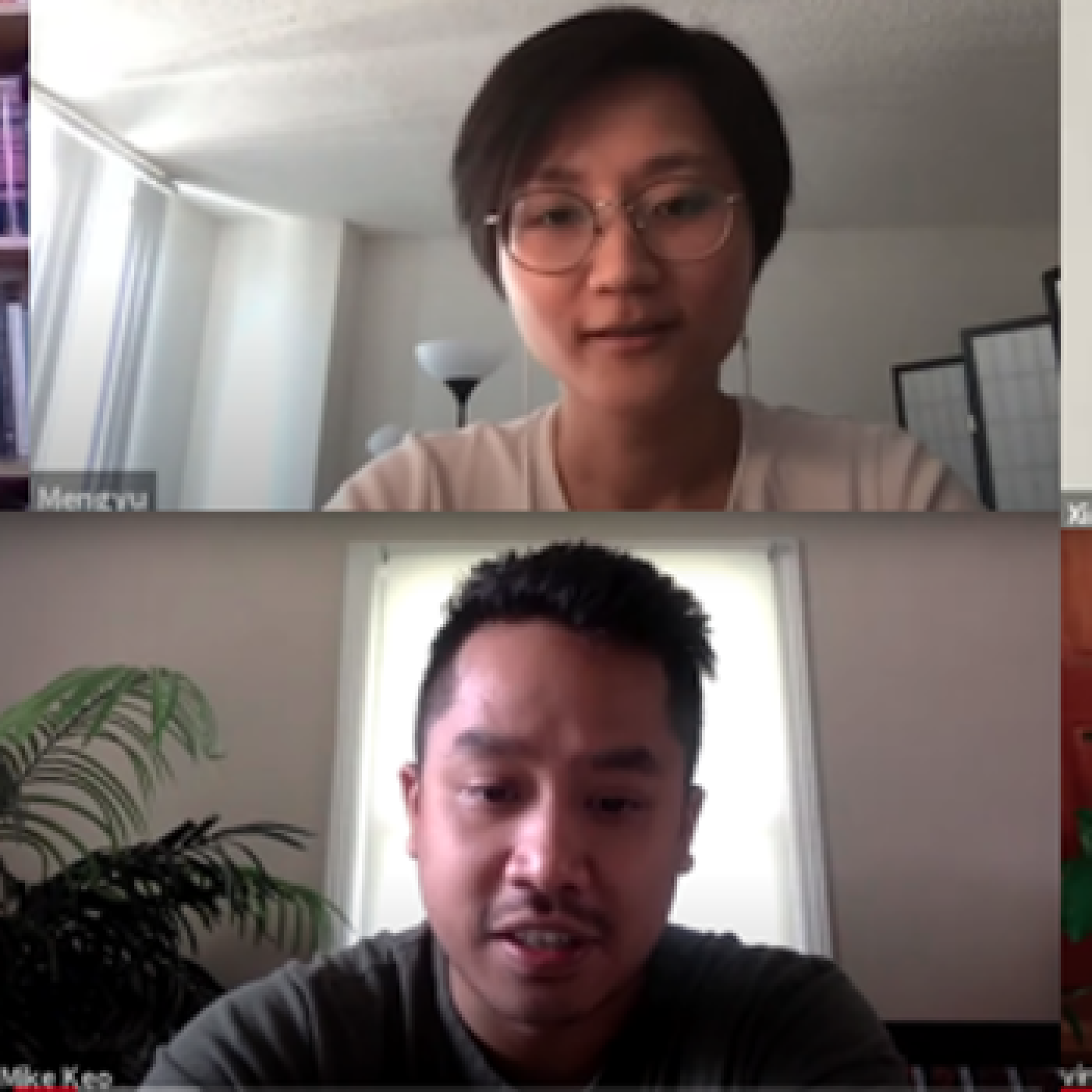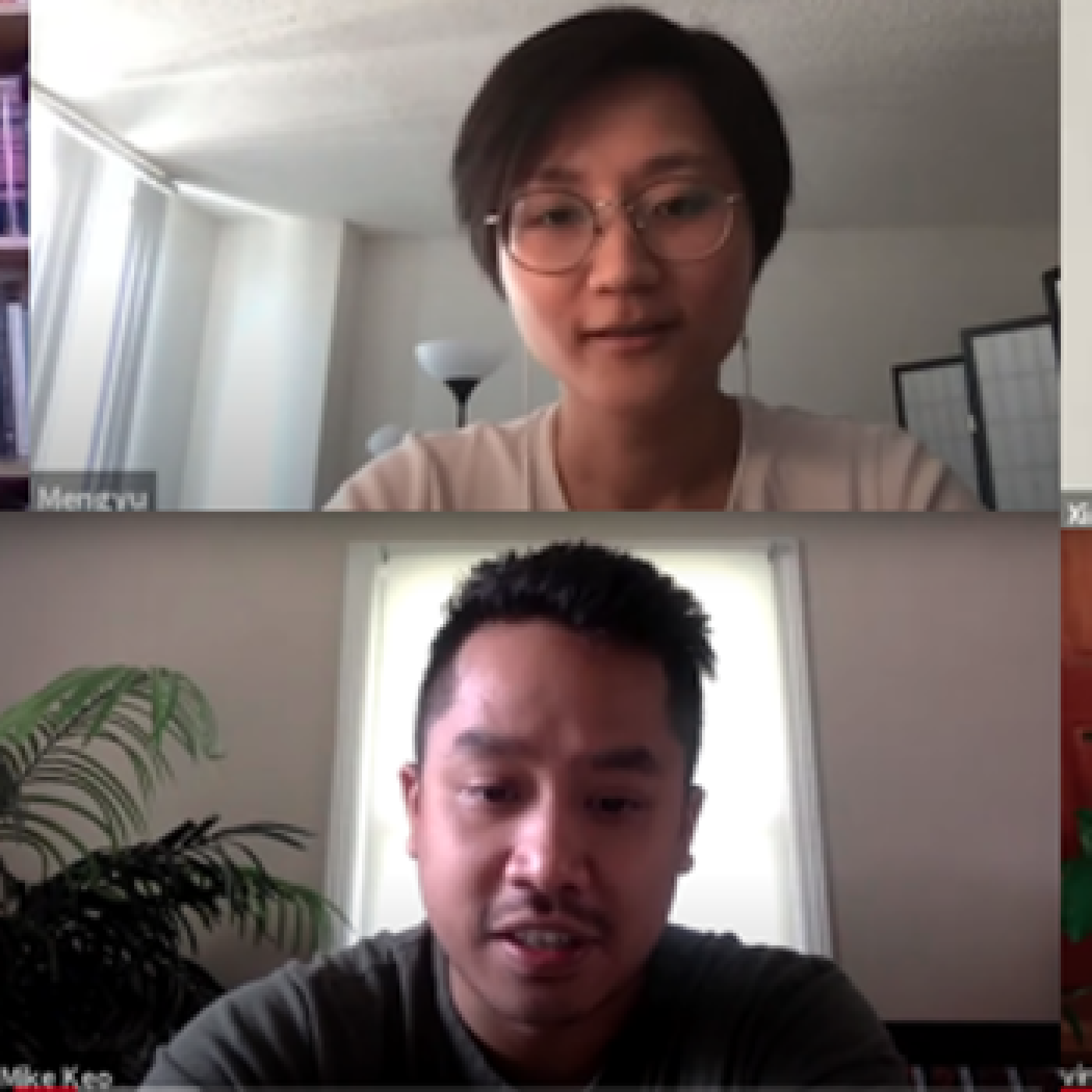Laney Xue Allison joins MOCA to discuss her experience as a transnational Chinese American adoptee and how it has shaped her experience. She addresses some of the racial tensions and difficulties that accompanied her childhood growing up with a white mother and being one of the few people of Asian descent in her community. She talks about her experience with Families for Children from China and how she developed a drive to understand and relate to Chinese culture because she was raised in a very American household. Laney explains how COVID-19 and the accompanying xenophobia have impacted her life as an Asian American, and she shares her thoughts on the current state of transnational adoption in America. She concludes by sharing her hopes for the future of the adoptee community.
OneWorld COVID-19 Oral Histories-Phase II
Laney Xue Allison
Kenneth Chin
Famous YouTuber Kenneth Chin, known as ActionKid on YouTube, joins MOCA to discuss challenges he encountered while documenting walking tours of different areas in New York City during the COVID-19 outbreak. He pinpoints when he first noticed a drastic shift in Chinatown’s atmosphere, as well as talks of his own experience in being targeted for several prejudice attacks during the pandemic. Through it all, he remains focused on balancing his accountant job with his YouTube career; his channel has influenced many from Toronto, Moscow, Seoul, and Brazil to start their own walking-tour channel. Walking in the city taught him the uncertainty of the future but he remains hopeful New York will recover in due time.
Linda Kwok
Linda Kwok shares her experience organizing fundraisers and PPE shipments from China in an effort to combat COVID in the United States. She explains her background as a Chinese American and how it helped her accomplish her mission to help hospitals and other organizations deal with the pandemic. She discusses her pride in being Chinese even in the midst of US-China tensions and hostility towards people of AAPI descent. She goes on to talk about China’s rise as well as some of the issues that she perceives the United States to be dealing with regarding COVID but also more broadly. She concludes by sharing her thoughts about what the United States should do to avoid falling behind.
Joanne Kwong
MOCA interviews Joanne Kwong, the president of Chinatown’s Pearl River Mart, to discuss the impact of the COVID-19 pandemic on her business and how she’s responded. She talks about her first time hearing of the virus as well as how people responded earlier in the pandemic. She explains what she did to prepare her business and staff for the challenges created by the virus and how she acquired PPE for the community and local hospitals. She discusses some of the silver linings of the pandemic but also how it has made PRM’s future more uncertain.
Jenny Lam
MOCA sits down with Jenny Lam, an independent artist and curator in Chicago, to discuss how the COVID-19 pandemic has impacted her work. She discusses how she had to change her plans for a show titled “Slay-sian” which exhibited the works of 39 Asian American artists. Jenny also talks about her perception of the pandemic in the U.S. and in Hong Kong where her family lives. The interview concludes with her thoughts on the importance of the arts during COVID-19 and the responsibility of Asian Americans to speak out against anti-AAPI sentiment.
Carol Xie
MOCA sits down with Carol Xie to discuss her experience volunteering at her family’s restaurant, Purple Dot, during the Covid-19 pandemic. Carol explains how she has been managing the restaurant’s social media presence while also working a separate job. She also talks about her family’s history and roots in China up until her father bought the restaurant. She discusses growing up adjacent to the Chinatown where Purple Dot is located as well as the importance of the area to her childhood. Carol offers further insight into her experience with the xenophobia inspired by the pandemic as well as how the neighborhood has been impacted by Covid-19. She also explains her strategy for marketing the restaurant and the future she hopes for Purple Dot.
Juliann Wang
Juliann Wang sits down with MOCA to discuss her experience as a Chinese artist during the COVID-19 pandemic. She talks about her experience participating in the online art show “Slaysian” as well as her hopes and goals for her art, before explaining how the pandemic has impacted her world and her view of art’s role in one’s daily life. She then goes on to discuss the impact of COVID on US-China relations and the rise of AAPI racism. She also elaborates on her personal journey from Anhui to different parts of the United States as well as how she received her education as an artist. Finally, she shares her hopes for the Chinese artist community and her plans for the future after COVID.
Yu Jenny Wang
Yu Jenny Wang describes her experience living through the COVID-19 pandemic to MOCA, contextualizing it through her family background as a first generation “restaurant child.” She shares her story about personally losing her grandfather and being frustrated by some of the hospital and government policies that made life more challenging. As a student at Brooklyn College, she explains how the pandemic has particularly impacted students and how she has tried to provide a sense of comfort to classmates as the head of the International Business Student Club. She concludes by sharing her desire to travel once the pandemic has abated.
Moonlyn Tsai and Yin Chang of Heart of Dinner
Heart of Dinner is a non-profit that has been providing meals to New York City’s Asian American elderly during the COVID-19 pandemic. It was founded by Yin Chang and Moonlyn Tsai originally as a supper club but due to the rise in anti-Asian hate they decided to pivot to help the elderly. In this oral history, they discuss their motivations for pivoting Heart of Dinner and how they work with community businesses to help provide meals for the elderly in Flushing, Manhattan, and Sunset Park. They tell anecdotes from their interactions with the elderly demographic that they serve and how they see the organization evolving after the pandemic.
Emma Wexler
Emma Wexler sits down with MOCA to discuss her experience as a Vietnamese-American adoptee as well as the landscape and politics around transnational adoption in the United States. She explains her relationship to her adopted American family in addition to how her race and ethnic heritage played a role in her early childhood experience. She delves into the historical background of transnational adoptions and the impact of the spread of COVID-19 and anti-AAPI sentiment on her and her community more broadly. She also elaborates on her experiences within the adoptee activist community and some of the big issues that she finds with the current system of adoption.
Yinghao Ma
Yinghao Ma is an architectural manager for the software department at the American Chemical Society. He grew up in China and moved to the U.S. and talks about his adjustment to living in the United States. He goes on to talk about the differences on how China and the U.S. approached the outbreak of the pandemic. Ma also discusses the impact that the pandemic has had on his family and the various activities that they feel comfortable doing. The issue of China’s governmental control of the Chinese population is touched on and Ma discusses his options on the information censoring within the Chinese government. Conversely Ma also discusses the ways he believes the U.S. government has made mistakes with the pandemic.
Jefferson Li
Jefferson Li’s family owns and runs the New York Chinatown butcher shop 47 Division Street Trading Inc. Like many Chinatown businesses, his family business took a huge economic hit due to the pandemic. Li took to the popular social news aggregator website Reddit to try and drum up business by publicizing their low prices to New Yorkers who wouldn’t normally be their primary demographic, becoming a pseudo celebrity in the process. As someone who has been in the Chinatown community prior to the pandemic, he talks about how the neighborhood has been changing and the negative impact on many of the local businesses. He goes on to discuss how he got into the family business and the legacy he hopes to leave for his children.
Justin Zhao, M.D.
Justin Zhao, M.D., is a senior resident in the emergency room in the Northwell health system. In this oral history he shares his motivations for becoming a doctor. He goes on to talk about when he first heard about COVID-19 and New York’s handling of the pandemic. Working in the emergency room he recounts his recollections of the early days of the pandemic and how the hospital had to pivot to handle it. In the wake of the racism surrounding the virus, Zhao talks about incidents that his colleagues had with patients and his personal incidents encountering racism. The talk ends with Zhao talking about the lasting ramifications of the pandemic.
Cindi Zdrinc
Photographer Cindi Zdrinc talks about her involvement with the online exhibition Slaysian, a show curated by Jenny Lam that spotlights Asian American artists. She further discusses how the pandemic has affected her photography business and how she has had to adapt. Later in the conversation we briefly touch on the anti-asian violence based on the political rhetoric and discuss what she thinks the current role of a photographer is with regards to the social issues of the nation. We finish the conversation by talking about what she feels Asians’ roles are in order to combat the current uptick in racism.
Ellie Brown
Ellie Brown is a patient coordinator at a gynecologist office in Richmond, Virginia. In this oral history she talks about her experience as a Chinese adoptee and her experience during the COVID-19 pandemic. She explains her background as a Chinese American adoptee and what it was like growing up in a white family. She discusses rejecting Chinese culture then later reclaiming her identity as a Chinese American. She reflects on getting laid off when the pandemic started and transitioning into a new profession in healthcare. She also elaborates on getting the vaccine herself and how her daily life has changed since the start of COVID-19. She goes on to talk about her engagement with the Black Lives Matter movement as well as her opinions on how the United States government is handling the pandemic.
Gracie Winogradsky
Gracie Winogradsky is a Chinese American adoptee who was born in China’s Fujian province and adopted into a Caucasian family. She talks about her experience growing up as an Asian American with a Caucasian upbringing in Atlanta. She shares some anecdotes about the racism she faced growing up and how she interpreted these incidents as a child. The oral history concludes with a discussion about what she hopes will come out of the pandemic.
James Liu
James Liu is an assistant director of the software development team at the American Chemical Society. In this oral history he talks about his transition moving to the United States with his family. As someone who works in the field of science Liu discusses how the pandemic has become politicized in both China and the U.S. Liu also talks about how his work-life balance has changed since he started working from home. He goes on to discuss how his Chinese American community and local restaurants in Maryland have been impacted by the pandemic and anti-Asian racism.
Billy and Duyen Chang
Billy and Duyen Chang are community church leaders. They share their experiences moving to the U.S. and the difficulty in continuing their education amid the racism they experienced. Along with her role in the church, Duyen Chang is a high-school teacher and she discusses how other Asian teachers have experienced discrimination. In the church both Billy and Duyen work with children in the community and partner with other organizations. With the pandemic having wrought huge change, the Changs discuss the challenges and unexpected benefits of transitioning their religious services to a virtual platform.
Wan Yinmei
Wan Yinmei is a social science researcher. She discusses her personal experience during the pandemic and talks about how as a Chinese person she has been dealing with the ramifications of the virus since December. She talks more about how the pandemic is affecting her social science research and how she has had to adapt. As a researcher who focuses on education, she talks about some issues that students face due to remote learning. She concludes the oral history by sharing what she sees as the future of Asians in America.


